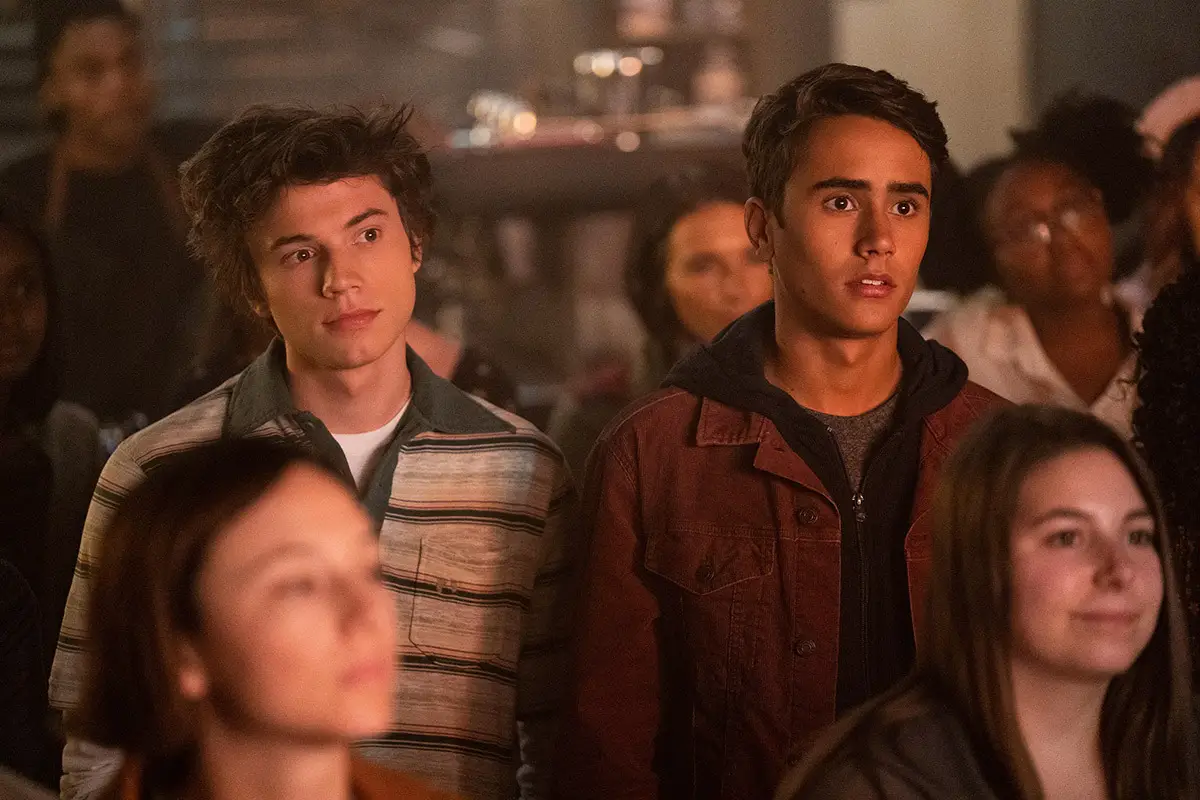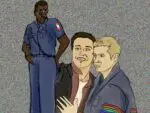“Love, Victor,” the television spinoff of Greg Berlanti’s 2018 film, “Love, Simon,” does not exactly pick up where the original movie left off. Though it takes place in the same high school and centers the story of a young, gay boy, the similarities just about end there.
Unlike Simon, Victor Salazar (Michael Cimino) is not white or wealthy. Victor comes from a working class, Latinx family, and the show provides an honest look into the home life of the Salazars, especially the relationship between Victor’s parents (Ana Ortiz and James Martinez). Also, Victor doesn’t have his sexuality all figured out from the get-go. In fact, Victor spends the vast majority of the show dating resident pretty girl Mia Brooks (Rachel Hilson) while secretly admiring brooding hottie Benji (George Sear), who is openly gay but inconveniently in a relationship.
Unlike Simon, whose troubles are limited to the scope of coming out to his already fairly accepting parents and friends, Victor faces religious family members and confusion about what he really wants. The show documents his journey toward a better understanding of his sexuality, with plenty of angsty, dramatic twists and turns along the way.
https://www.youtube.com/watch?v=uh-IaEaEdE0
Simon Spier (Nick Robinson) from “Love, Simon” isn’t entirely cast aside in the new Hulu special. After all, Victor goes to Creekwood, the same high school from which Simon would have graduated in the movie, so Victor has heard of Simon’s story. In the first episode, Victor decides to message Simon and inform the older boy of his move to Creekwood and his predicament regarding his sexuality. Through this somewhat gratuitous plot device, Simon appears as a voiceover reading text message responses to Victor throughout most of the 10-episode series, as well as appearing in person toward the end of the show.
In most ways, “Love, Victor” is what every good high school romantic drama should be. Like other shows of its genre, at its worst, the acting is cringy, the plot points are cliched and the purported high schoolers are entirely unbelievable as characters. But “Love, Victor” finds its rhythm around the second or third episode and does not look back. Cimino is especially convincing as the show’s protagonist — a sweet, caring boy who puts the needs of others before himself but is still fundamentally confused about who he wants to be. Victor has all of the hope, uncertainty and naïveté of any modern high school student: He is lovable and recognizable.
Though “Love, Victor” is, at its core, a show about high school, some of its most successful moments occur in different settings: the eighth episode, “Boys’ Trip,” in which Victor travels to New York City to meet Simon’s boyfriend, Bram (Keiynan Lonsdale), and their college friends; the scenes that explore Victor’s mother’s infidelity and its impact on her relationship with her husband; and the seventh episode, “What Happens in Willacoochee,” in which Victor goes on a road trip with Benji and realizes his true feelings for his coffee shop co-worker.
“Boys’ Trip” probably stands out the most because it is the first episode of the series in which Victor is honest with himself about his need to explore his sexuality, a turning point that comes after multiple episodes depicting Victor’s somewhat painful repression of his gay identity and his attempts to assimilate. In a slightly unrealistic turn of events, Victor fakes a permission slip for a weekend basketball camp to trick his parents, and hops on a bus to New York City to meet up with Bram, of the original “Love, Simon.”
Victor is caught off guard by the open queerness of Bram and Simon’s friends and initially covers up the real reason for his trip, but ultimately, he realizes that he has no reason to hide his truth. In an especially poignant moment of the episode, Bram brings Victor to a pick-up game for his gay basketball league. “I just wanted you to see that there’s no one way to be gay. Right? You could be femme, you could be butch, athletic, or in Simon’s case, painfully unathletic … But the one thing you can’t be is afraid,” Bram tells Victor as they sit on a bench after the game.
Here, “Love, Victor” breaks out of the high school drama mold, both in setting and in subject matter, exploring a moment of reckoning that occurs in the lives of many queer people when they first enter a world that is fundamentally accepting and need to figure out how to live and embody an identity that they might have become accustomed to hiding. This episode of “Love, Victor” is honest and heartwarming — an essential on-screen representation of queer experiences for a young audience.
As a rule, “Love, Victor” does best when it does not confine itself to the walls of Creekwood High. The few scenes in the hallway and at the school fair feel inorganic and somewhat stale, which detracts from the originality of the show’s characters and plot. When the camera finds its way into the homes of its characters though, particularly Lake’s (Bebe Wood) and Felix’s (Anthony Turpel), “Love, Victor” has its greatest successes. Lake and Felix should also be noted as phenomenal supporting characters, both recognizable in their respective locations on the high school food chain but refreshingly nuanced and complicated compared to your typical teen drama portrayals.
Whereas Lake and Felix stand out, Andrew (Mason Gooding) and Pilar (Isabella Ferreira) unfortunately blend in. Neither character is granted the backstory or complexity that they seem to deserve based on their roles in the plot of the show. Andrew, for one, plays the archetypal high school bad boy with a good heart. Though he has a couple of touching scenes with Mia, he does not bring any great surprises or insights to the table.
Similarly, Ferreira plays the role of the angry, rebellious, fiercely loyal Pilar to perfection, but her character is not developed to the point that Pilar ever has real autonomy on screen. The exception to Pilar’s general flatness as a character is a scene at the end of the show in which she and Felix decide to get rid of their phones for the evening and hang out in person, forming a delightfully unexpected friendship. At the end of Season 1, both Pilar and Andrew are set up for further involvement in the plot, which hopefully means that their characters will see further screen time and development in upcoming seasons.
And in some ways, the moments in which “Love, Victor” lacks originality are also its greatest successes. “Love, Victor” represents a normalization of the queer experience to the point that it is, at times, just like any other soapy high school drama, except featuring a gay, Latinx kid instead of a straight, white protagonist.
Unlike “Love, Simon,” which seemed almost afraid to deviate from the oft-represented privileged high school experience beyond its main character’s sexuality, “Love, Victor” embraces the intersectional identities of its protagonist and supporting characters. And though some of the dialogue can be cringy, and the acting is not of the highest caliber, “Love, Victor” is warm, heartfelt and honest about storylines and relationships that matter, that are recognizable to anyone who has experienced high school, especially members of the LGBTQ community. For all its ups and downs, “Love, Victor” is a triumph of representation and an entertaining, fulfilling watch.

















